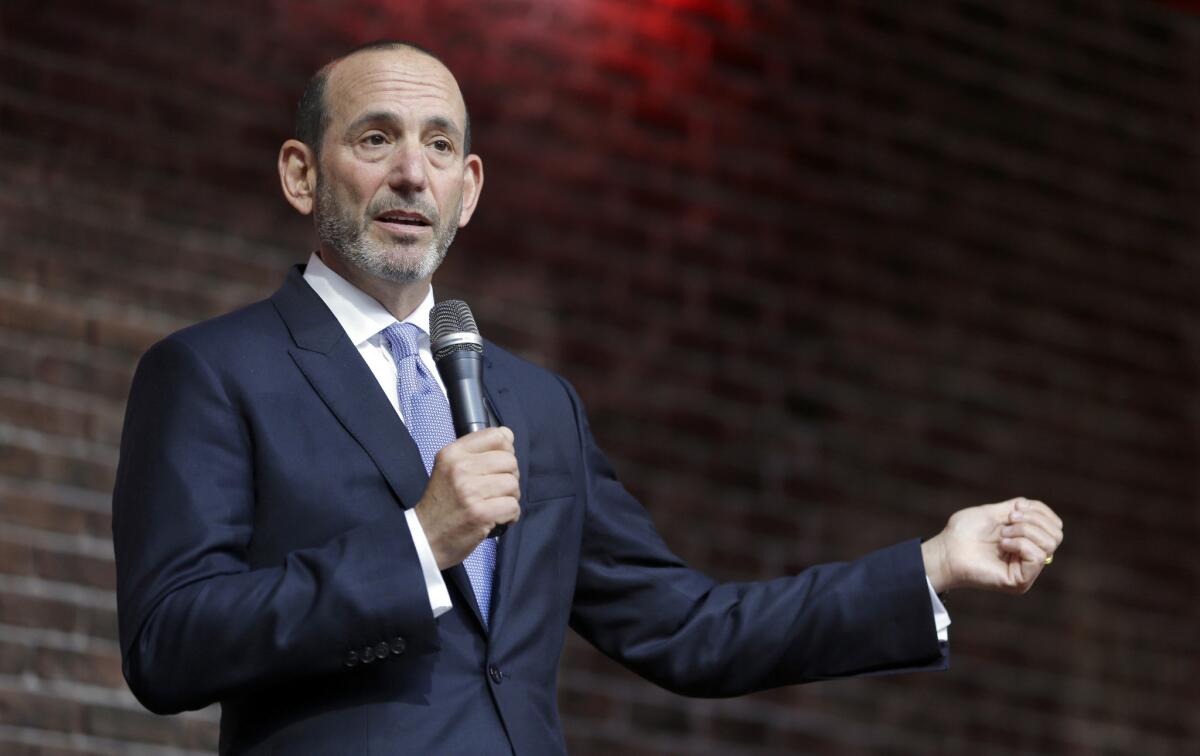MLS Commissioner Don Garber isn’t celebrating triumphs; he’s too focused on the future

Major League Soccer Commissioner Don Garber, shown in May 2015, says, “Our best days are probably still ahead.”
One reason for the recent success of Major League Soccer is Commissioner Don Garber’s refusal to celebrate past triumphs, choosing to look ahead toward more victories instead. That trait was evident Sunday, when MLS kicked off its 21st season with its best opening weekend.
“Our best days are probably still ahead,” promised Garber, who saw Portland open defense of its league title by beating Columbus in a rerun of last December’s MLS Cup final before he flew to Southern California to see the Galaxy beat D.C. United.
Garber was rewarded for his focus Sunday, when the 10 MLS games drew an average crowd of 26,152, better than France’s Ligue 1 and Italy’s Serie A and just a handful of fans shy of the weekend average for Spain’s La Liga, according to SoccerAmerica.
See the most-read stories in Sports this hour>>
MLS is already the longest-running professional soccer league in U.S. history. And last year it set records for attendance and broadcast revenue. Yet Garber was looking past even those accomplishments and toward more growth, with four teams expected to enter the league by the 2020 season.
LAFC, the league’s soon-to-be-second Southern California franchise, and Atlanta United are on schedule to open the 2018 season in new stadiums. But the two expansion franchises that will follow, in St. Paul, Minn., and Miami, still have some hurdles to clear.
“Things are moving forward,” Garber said in a brief meeting with two reporters at halftime of the Galaxy game.
“I feel good about both markets.”
Minnesota United’s proposals for a home in Minneapolis were derailed so it moved to St. Paul, where last week the city council backed plans for a project that would include a $120-million, 19,000-seat soccer-specific stadium.
In Miami, an ownership group headed by former Galaxy midfielder David Beckham missed a February target date for securing county land northwest of downtown where a 25,000-seat soccer stadium is planned. The need for new parking lots is the latest sticking point.
Garber said there is “no shortage of things that need to be finalized in Miami for us to be able to flip the switch. We are further along in Minnesota. They’re announcing a whole of things they are doing almost on a daily basis.”
In another move toward growing the league, MLS loosened its purse strings slightly this winter, giving each team $800,000 in “targeted allocation money” to be used for players with base salaries between the league maximum of $457,500 and $1 million. The idea is to improve the depth of rosters by signing players who don’t necessarily merit rich designated-player contracts, but who deserve more than the maximum salary allowed for non-DPs under the league salary cap.
“It’s been very, very successful,” Garber said. “It was calculated. It was very specific to try to improve the middle of the roster and do it in a way that ensures that our clubs are smart and careful about how they utilize cash.
“It’s early. It’s just the first week of the season. But so far everything I’ve heard from owners and coaches and technical directors is that the program is smart. And I’m convinced it will be successful.”
Last year, MLS fielded a record 252 foreign-born players and the targeted-allocation money is designed to increase that number. But Garber, fearing the kind of big-spending free-for-all that bankrupted the North American Soccer League three decades ago, quashed calls to ditch the salary cap to make the league even more attractive.
“There’s no doubt that if you spend more money, in any business, ultimately the quality is going to grow,” he said. “But we need to manage what we have in relation to our revenue and do it in a way that we can ensure that we are growing carefully.”
Follow Kevin Baxter on Twitter @kbaxter11
More to Read
Go beyond the scoreboard
Get the latest on L.A.'s teams in the daily Sports Report newsletter.
You may occasionally receive promotional content from the Los Angeles Times.











